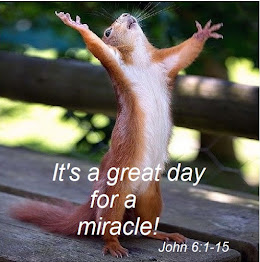There’s a little
story of a bishop who, when officiating at a Confirmation, asked the young
people to explain the Trinity. The class
clown stood up and mumbled something quietly.
The bishop remarked, “I didn’t understand that.” The kid spoke up louder, “You’re not supposed
to, it’s a mystery.” While the bishop
and the rest of the congregation in attendance chuckled, the fact is that the
Church has wrestled with all manner of ways to understand a “Three-Person” God. It's a mystery that takes more faith than
words to explain. For most of my life,
and I’ll bet for most people, “It’s a mystery” was enough. That doesn’t mean we shouldn’t try to
understand the Holy Trinity on a deeper level because it is, as the Catechism
states, “the central mystery of Christian faith and life. It is the mystery of God in himself.”
We’ll never
be able to grasp the reality of the Trinity – one God, three persons of Father,
Son and Holy Spirit – until we experience the fullness of God’s love in our
eternal life. This hasn’t stopped us,
though, from trying to get our heads around this idea of the Trinity. Church history is filled with attempts to tie
down its meaning, all of them coming up short and many of them earning heresy
status.
If we’ve
failed to tie down the mystery of the Trinity through theological concepts, we
moved to analogy and art. Just a few
examples include the equilateral triangle; three intersecting circles; circle
within a triangle; St. Patrick’s shamrock; and the famous icon by Andrei Rublev
depicting three identical persons around one altar. Again, each comes up short.
But this
shouldn’t surprise us. Imagine trying to
perfectly represent love. Imagine being
asked to define in words or a picture a relationship that grips us at the very
core of our life. The love of a parent
for a child, the bond of husband and wife, or the friendship with the one who knows
us best are beyond words, beyond art, beyond poetry, beautiful as they might
be. They always come up short.
Father, Son
and Holy Spirit is the most real and profound relationship that exists. The gospels tell the story of the Son of God
sent by the Father to reveal the depth of God’s love for us, and how, through
the Spirit, we’re sent – in the name of the Father, Son and Holy Spirit – to
love as we have been loved [Matthew 28:19, John 13:34].
We enter the
mystery of this Trinitarian relationship just as we do in any other
relationship. We begin with a personal
relationship, by coming to know the other and allowing the other to know
us. We begin by spending time with Jesus
and opening ourselves up to Him. When
this happens, all our other relationships begin to reflect – even if
imperfectly – the perfect relationship of love of Father, Son and Holy Spirit. It all begins with the mystery of falling in
love and allowing ourselves to be loved in return.



















